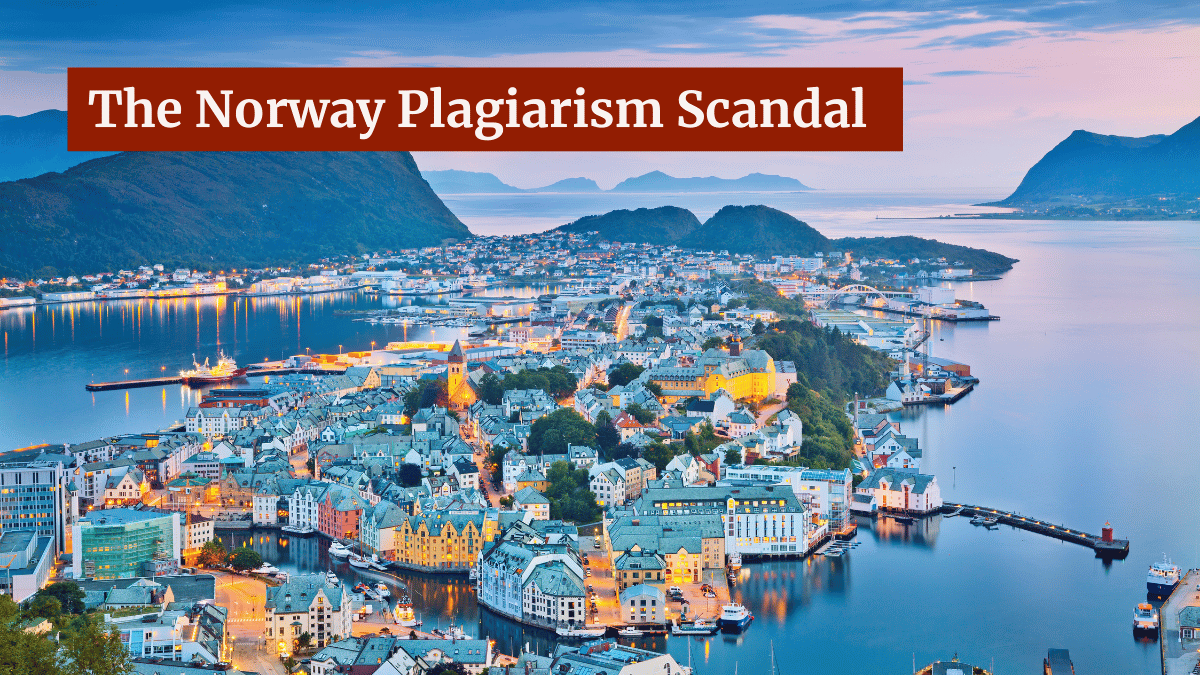The Norway Plagiarism Scandal

Over the past six weeks, we have seen several cases of divisive public figures being targeted by plagiarism investigations. Those have included Claudine Gay, Neri Oxman and, most recently, Sherri Ann Charleston, Harvard’s chief diversity and inclusion officer.
However, the United States has never had a monopoly on such stories. In the past, we’ve seen similar stories involving Germany, Romania, Spain and Russia to name just a few. Globally, divisive figures, in particular those who are politically charged, have come under increased scrutiny for plagiarism. Sometimes justifiably, sometimes less so.
Now we can add Norway to that long list of countries as a pair of plagiarism scandals have already resulted in the resignation of one minister and have another fighting to keep their position.
To make matters worse, the minister who resigned was the minister for research and higher education for the country and had led an aggressive campaign against academic integrity infractions, including plagiarism.
To understand what this means, we must first look at what happened and then we can see what it means for other academics, especially those in politically divisive positions.
The Story of Norway’s Plagiarism Scandal

Marius Fiskum, CC BY 2.0,
via Wikimedia Commons
The story begins with a 27-year-old student named Kristoffer Rytterager, who attends the BI Business School in Oslo. According to Rytterager, he became upset that students who were accused of self-plagiarism, reusing previous work without clear acknowledgement, were being aggressively pursued.
According to the AP report, those students won a victory at a lower court but the minister for higher education appealed that decision to the Supreme Court of Norway.
That put the minister, Sandra Borch, in Rytterager’s crosshairs, with him saying that “Students were being expelled for self-plagiarism. I got angry and I thought it was a good idea to check the minister’s own work.”
He began by examining Borch’s master’s thesis and that check quickly bore fruit. By examining passages that he felt were too well written, he discovered that Borch had plagiarized previous work.
He published his findings on X, formerly Twitter, and the media latched on to the story. Borch quickly announced her resignation, saying that “When I wrote my master’s thesis around 10 years ago, I made a big mistake. I took test from other assignments without stating the sources.”
However, the media continued to investigate Borch’s work, with the publication E24 finding that over 20% of the thesis had been copied from other student assignments. Shortly after that, the publication Aftenpoften discovered that another 10,000 characters had been taken from a separate report.
Unfortunately for the Norwegian government, the story did not end there. Shortly after Borch resigned, the nation’s Minister of Health, Ingvild Kjerkol, faced accusations that she both committed plagiarism and fabrication in her thesis.
Kjerkol, however, has not resigned and blames the issue on “editing errors”. The nation’s Prime Minister, Jonas Gahr Støre, has accepted Borch’s resignation but is standing by Kjerkol, saying that it is up for academics and not politicians to judge how serious the infractions are.
He also instructed all his ministers to check their back catalogs for any potential plagiarism issues.
This raises a simple question: What should others glean from this story? To that end, the answer is simple, it’s important for academics to get ahead of plagiarism and the time is running out to do so.
What This Story Teaches Us
What stands about this story is that Borch wasn’t brough down by a journalist or a well-funded political organization, she was brought down by a lone student who was angry about her policies.
To be clear, what that student did wasn’t particularly difficult or costly. Not to denigrate their work, but all they did was access the thesis and then search for passages that seemed suspicious. This is something anyone with access to social media and a search engine can reasonably do.
Borch, for her part, clearly knew that these issues were there. Her quick resignation, even before the full weight of her plagiarism was known, is very telling.
However, in the decade since she submitted the thesis, she never made any attempt to correct or rectify the issue. She simply hoped that no one would check, even as she went on a heavy-handed anti-plagiarism campaign.
This meant that, the first time someone did take the time to check, they had little trouble finding convincing evidence of plagiarism. While correcting or resubmitting a thesis is never ideal, it’s many times better to do it proactively than after a scandal breaks.
But that’s the exact opportunity that Borch missed and all it took was one curious student to bring the house of cards crashing down. That, in turn, is the lesson for academics. While it’s best to not have any clear plagiarism in your past, if you do and are aware of it, the time to get ahead of it is now. If you are unsure whether you have an issue, the time to check is now.
While it would be easy to say that this is especially true for public figures such as university presidents, government officials and so forth, the truth is that anyone can become a public figure at just about any time.
In the age of social media, there’s rarely a guarantee of a quiet, private life, especially in academia. As the faculty at MIT are learning with the threats to evaluate all their research, sometimes just being adjacent to a controversy is enough.
As such, the wise move is to figure out what, if any, plagiarism issues you may have and address them proactively. Later may simply be too late.
Bottom Line
The AP report concludes with a quote from Rytterager who, despite feeling ambivalent about the “feeding frenzy”, expressed concern over the consequences of his investigation.
“I am afraid that in the future we may not have politicians that have ever taken a risk in their lives because they are afraid to get dragged through the dirt.”
While understandable, I think that fear is an exaggeration. In my conversations with academics, including public-facing ones, most don’t seem to think that there are any serious issues or that, if there are, they won’t be examined.
To be clear, there is some logic to that. Despite the large number of stories, we’re seeing, the time and energy it takes to perform a plagiarism analysis is still a barrier to widespread checking. Ultimately, even among this “feeding frenzy”, relatively few academics will have their work checked.
But that doesn’t mean that plagiarism or other academic integrity issues aren’t a time bomb that could go off at any moment. Personally, I’d rather defuse the bomb and be comfortable that, even if I am investigated, nothing will come of it.
However, that’s exactly the debate countless academics, journalists and other public figures having to weigh right now.
Want to Reuse or Republish this Content?
If you want to feature this article in your site, classroom or elsewhere, just let us know! We usually grant permission within 24 hours.
